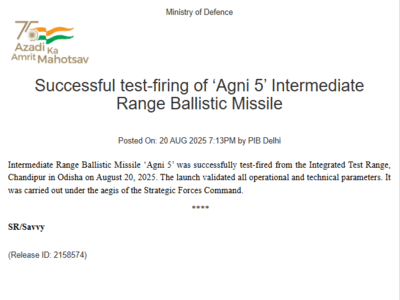NEW DELHI: India on Wednesday successfully test-fired its nuclear-capable intermediate range ballistic missile (IRBM) Agni-5 from the integrated test range (ITR) at Chandipur in Odisha, the defence ministry said.
The launch, conducted on August 20, 2025, under the strategic forces command, validated all operational and technical parameters of the missile. Defence officials said the test was part of routine user trials aimed at ensuring the system’s readiness.
Developed by the defence research and development organisation (DRDO), Agni-5 is among India’s most advanced long-range missiles with a range of over 5,000 kilometres. Equipped with modern navigation, guidance, warhead and propulsion technologies, it strengthens India’s nuclear deterrence.
The ministry said the successful test reaffirms India’s commitment to maintaining a “credible minimum deterrence posture.”

Things to know about Agni-5
India’s test has raised alarms in Islamabad. The Strategic Vision Institute (SVI), a Pakistan-based think tank, has warned Prime Minister Shahbaz Sharif and army chief Asim Munir that India’s missile programme poses “serious risks” to regional stability.
The SVI noted that India’s missile development accelerated after it joined the missile technology control regime (MTCR) in 2016, gaining access to advanced systems. It warned that with future variants exceeding 8,000 km range, India could potentially target cities as far as Washington, Moscow and Beijing.
Pakistan’s concerns also extend to India’s growing naval nuclear arsenal, including submarine-launched ballistic missiles. According to the think tank, the Agni-5 test signals India’s global strategic ambitions and calls for international pressure on New Delhi to “refrain from destabilising moves” and pursue dialogue instead.
The launch, conducted on August 20, 2025, under the strategic forces command, validated all operational and technical parameters of the missile. Defence officials said the test was part of routine user trials aimed at ensuring the system’s readiness.
Developed by the defence research and development organisation (DRDO), Agni-5 is among India’s most advanced long-range missiles with a range of over 5,000 kilometres. Equipped with modern navigation, guidance, warhead and propulsion technologies, it strengthens India’s nuclear deterrence.
The ministry said the successful test reaffirms India’s commitment to maintaining a “credible minimum deterrence posture.”
Things to know about Agni-5
- Nuclear-capable ICBM: Agni-5 is a land-based Intercontinental Ballistic Missile (ICBM) with Multiple Independently Targetable Reentry Vehicle (MIRV) capability, developed by India’s Defence Research and Development Organisation (DRDO).
- Extended range: Designed for nuclear use, Agni-5 has a range of over 5,000 kilometres. DRDO is working on an upgraded variant with an expected range of up to 7,500 kilometres.
- MIRVed test launch: On March 11, 2024, India conducted the first MIRVed test launch of Agni-5 from Kalpakkam in Tamil Nadu, validating its ability to carry and release multiple warheads.
- Warhead capacity: The missile is capable of carrying and firing up to three nuclear warheads simultaneously.
- Future enhancements: New variants under development aim to integrate bunker-buster bomb technology, expanding the missile’s strike capability against fortified targets.
India’s test has raised alarms in Islamabad. The Strategic Vision Institute (SVI), a Pakistan-based think tank, has warned Prime Minister Shahbaz Sharif and army chief Asim Munir that India’s missile programme poses “serious risks” to regional stability.
The SVI noted that India’s missile development accelerated after it joined the missile technology control regime (MTCR) in 2016, gaining access to advanced systems. It warned that with future variants exceeding 8,000 km range, India could potentially target cities as far as Washington, Moscow and Beijing.
Pakistan’s concerns also extend to India’s growing naval nuclear arsenal, including submarine-launched ballistic missiles. According to the think tank, the Agni-5 test signals India’s global strategic ambitions and calls for international pressure on New Delhi to “refrain from destabilising moves” and pursue dialogue instead.
You may also like

Fiji PM Sitiveni Rabuka to visit India: First official trip from August 24-26; meeting with PM Modi, ICWA speech on agenda

Alexander Isak will be 'welcomed back to Newcastle with open arms' despite bombshell statement

Tourists banned from Costa del Sol sea as deadly 'blue dragons' spotted

Ridiculously tough GCSE maths question leaves parents scratching their heads

Vladimir Putin launches hypersonic attack in worst raid since Alaska summit







